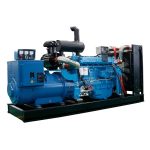Introduction
In today's fast-paced world, the demand for reliable and efficient power generation solutions is higher than ever. Diesel generators have long been a popular choice for providing backup power in various settings, from residential homes to industrial facilities. One of the key advantages of diesel generators is their fuel efficiency, which makes them a cost-effective and environmentally friendly option for many applications. In this article, we will explore the factors that contribute to the fuel efficiency of diesel generators and provide tips for maximizing their performance.
Understanding Diesel Generators
Diesel generators are a type of internal combustion engine that uses diesel fuel to generate electricity. They consist of a diesel engine connected to an electric generator, which converts mechanical energy into electrical energy. Diesel generators are commonly used as backup power sources in situations where grid power is unreliable or unavailable, such as during power outages or in remote locations.
One of the main reasons why diesel generators are preferred for backup power is their fuel efficiency. Diesel fuel has a higher energy density compared to other fuels like gasoline, which means that diesel generators can produce more power with less fuel. This efficiency is further enhanced by the design of diesel engines, which are known for their durability, reliability, and long service life.
Factors Affecting Fuel Efficiency
Several factors influence the fuel efficiency of a diesel generator, including engine design, load capacity, maintenance practices, and operating conditions. Understanding these factors can help users maximize the performance of their diesel generators and reduce fuel consumption.
1. Engine Design: The design of the diesel engine plays a crucial role in determining fuel efficiency. Diesel generator for sustainable power are designed to optimize combustion efficiency, reduce friction losses, and minimize heat loss. Features such as turbocharging, direct fuel injection, and electronic controls help improve fuel economy and overall performance.
2. Load Capacity: Diesel generators are most fuel-efficient when operating at or near their optimal load capacity. Running a generator at a lower load than its rated capacity can result in decreased fuel efficiency, as the engine may not be operating in its most efficient range. On the other hand, overloading a generator can lead to increased fuel consumption and accelerated wear and tear on the engine.
3. Maintenance Practices: Regular maintenance is essential for ensuring the fuel efficiency of a diesel generator. This includes changing the oil and filters, inspecting the fuel system, checking for leaks, and monitoring engine performance. Proper maintenance helps prevent issues that can reduce fuel efficiency, such as clogged filters, dirty injectors, or worn-out components.
4. Operating Conditions: Environmental factors such as temperature, humidity, altitude, and air quality can impact the fuel efficiency of a diesel generator. Extreme conditions, such as high temperatures or low oxygen levels, can affect engine performance and fuel consumption. It is important to consider these factors when selecting a diesel generator and optimizing its operation.
Maximizing Fuel Efficiency

To maximize the fuel efficiency of a diesel generator, users can implement the following tips and best practices:
1. Right Sizing: Selecting a generator that matches the power requirements of the load is essential for maximizing fuel efficiency. An oversized generator may consume more fuel than necessary, while an undersized generator may struggle to meet the demand, leading to inefficiencies. Conducting a thorough load analysis can help determine the appropriate generator size for the application.
2. Regular Maintenance: Adhering to a routine maintenance schedule is critical for keeping a diesel generator operating at peak efficiency. This includes checking and replacing filters, monitoring fluid levels, inspecting the fuel system, and tuning the engine as needed. Proper maintenance can extend the life of the generator and reduce fuel consumption.
3. Fuel Quality: Using high-quality diesel fuel is important for ensuring optimal performance and fuel efficiency. Contaminated or low-quality fuel can lead to engine damage, reduced efficiency, and increased emissions. It is recommended to source fuel from reputable suppliers and store it properly to prevent contamination.
4. Optimal Operating Conditions: Maintaining the diesel generator in a suitable environment can help improve fuel efficiency. Providing adequate ventilation, controlling temperature and humidity levels, and ensuring proper airflow around the generator can enhance engine performance and reduce fuel consumption. Avoiding extreme operating conditions can also prolong the life of the generator.
5. Load Management: Managing the load on the generator efficiently can contribute to fuel savings. By balancing the power demand with the generator's capacity, users can avoid unnecessary fuel consumption and reduce wear and tear on the engine. Implementing load shedding strategies and using energy-efficient equipment can help optimize fuel efficiency.
Conclusion
Diesel generators are a reliable and efficient power generation solution for various applications, thanks to their fuel efficiency and robust design. By understanding the factors that influence fuel efficiency and implementing best practices for maintenance and operation, users can maximize the performance of their diesel generators and reduce fuel consumption. Whether used for backup power in residential settings or as a primary power source in industrial facilities, diesel generators offer a cost-effective and sustainable solution for meeting power needs. With proper care and attention, diesel generators can provide reliable power for years to come while minimizing their environmental impact.
